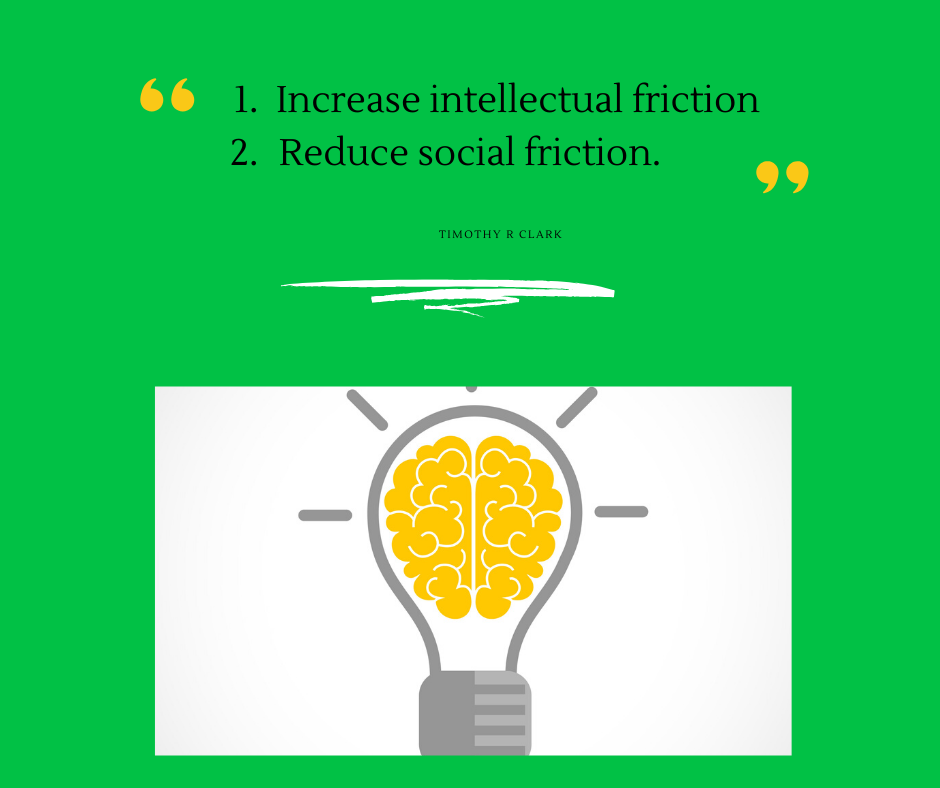I was listening to a podcast with Timothy R Clark on the “Four Stages of Psychological Safety”, and I highly recommend it and his book.
Psychological safety is being able to show and employ one’s self without fear of negative consequences of self-image, status or career (Kahn 1990, p. 708). It is “a condition in which you feel (1) included, (2) safe to learn, (3) safe to contribute, and (4) safe to challenge the status quo- all without fear of being embarrassed, marginalized or punished in some way.”(Timothy R Clark, 2019) It can also be defined as a shared belief that the team is safe for interpersonal risk taking. In psychologically safe teams, team members feel accepted and respected. It is also the most studied enabling condition in group dynamics and team learning research.
Timothy described a leader’s primary role as being a steward of an organisation, something I have heard before and like immensely. But this steward of an organisation had two primary functions:
1. To increase the intellectual friction within the organisation by encouraging and rewarding hard hitting dialogue and debate – the dialogue we need to solve problems, use critical thinking, innovate, make good decisions etc.
2. The second role was to reduce social friction – that is to reduce the issues that crop up when we are in social teams that result in conflict and friction between teams and colleagues. Because it is this social friction that results in low productivity, lack of collaboration, lack of transparency ie no progress, no growth.
Sounds pretty good right? You really only have two main roles as a leader. Assuming the above is met, all of your outcomes will be achieved high employee advocacy/engagement, high customer retention, innovation, team orientation, productivity – essentially all the things that we are actually focused on delivering in an organisation – perhaps just in the wrong way.
I have always loved the quote by Albert Einstein “we cannot solve our problems with the same thinking we when we created them”.
This makes sense to me, many leaders have sat in a boardroom saying that in this VUCA (volatile, uncertain, complex, ambiguity) world we need new thinking. We cannot continue business as usual and just as many say that we need to start with a hard dose of reality and reflection. So how do we succeed at increasing intellectual friction and reduce social friction? What are your thoughts? Here are some of my thoughts…
1. Model the right behaviours by driving performance and reward around the right behaviours and accountability within tasks.
2. Activate your listening skills within the organisation
3. Growth Mindset – develop a growth and benefit mindset throughout the organisation. Encourage information sharing, collaboration, and team orientation. Create a speak up culture that creates a safe place for sharing information
4. Remove fear – remove fear from every facet of your organisation. The fear to participate, the fear to contribute, the fear to admit to failures, the fear to ask for help, the fear to speak up, the fear to ask for feedback, the fear to give feedback, the fear to ask for clarity.
5. Be aware of bias – seek bias training across the organisation so that everyone is able to challenge bias and engage in critical thinking when it is required.
6. Emotional intelligence – self awareness and the ability to label our emotions and reframe are all examples of emotional intelligence. It starts with self and understanding where our own perceptions, values and perspectives are founded. It helps us to become more curious about ourselves and how we engage with others.
7. Social intelligence – we all want to belong but managing group dynamics is difficult. Understanding ourselves and how we relate to others. Knowing how to facilitate better discussions and get the most out of people, to motivate and encourage is critical to driving better engagement and performance.
8. Attentional intelligence – in the 80s it was all about time management. Now it is more about cognitive effort and energy management.
Carolyn is the founder of 6peas marketing and engagement. Our purpose is to create “aha” moments with business leaders by translating learnings in neuroscience into strategies and solutions that focus on our people – employees, customers and leaders. At 6peas, we focus on 6pillars of growth – Leadership founded in neuroscience, Customer Centricity/Experience Management, Psychological Safety/Employee engagement , Purpose I Brand, and Culture founded in Psychological Safety, Governance.

